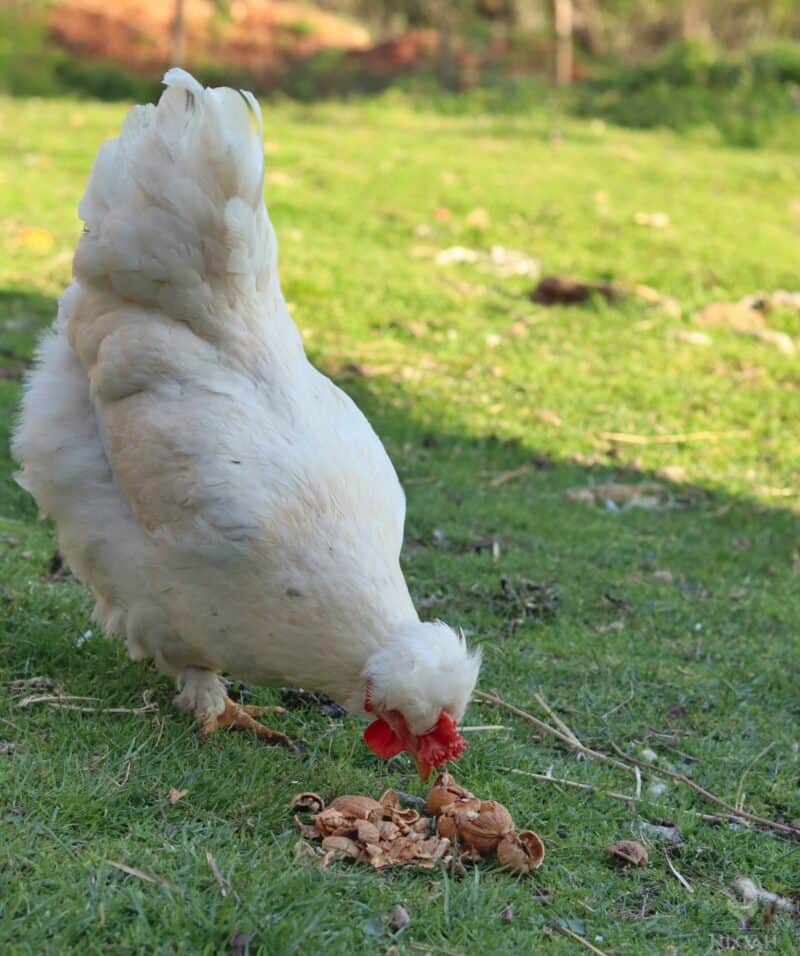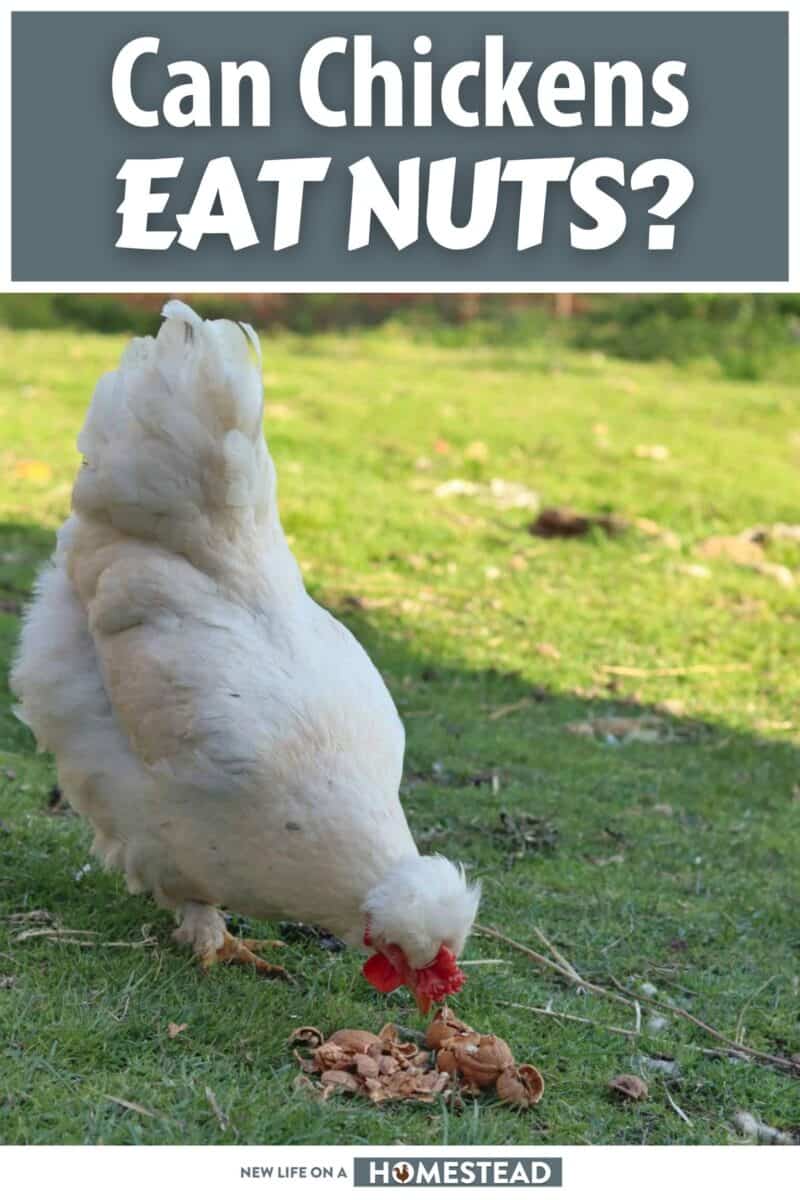One of the most popular and plentiful natural foods around the world, and in every culture, is nuts.

Nuts are used as healthy snacks and as ingredients in all kinds of different dishes and are one of those things that people eat that chickens are likely to encounter in their natural environment. But can chickens eat nuts?
Yes, chickens may eat most nuts. Though there are exceptions, the majority of trees and other nuts are healthy, nutritious, and filling for chickens. Proper preparation is important for minimizing any attendant risks from choking or toxicity, however.
So there you have it. As you probably expected chickens are able to eat most nuts with no problem. They will also derive quite a bit of nutrition from them.
Whether you want to make better use of the nuts growing on your property or just give your birds an interesting snack, keep reading to find out everything you need to know.
Nutritional Profile of Nuts
The nutritional profile of a given nut is entirely dependent upon its species of which there are many, but generally speaking nuts contains an excellent cross-section of macronutrients in the form of fats, proteins, and some carbohydrates and also micronutrients in the form of vitamins and minerals.
| 100g Almonds | Amount |
|---|---|
| Water | 4.26g |
| Calories | 626 kcal |
| Protein | 21.4g |
| Total Fat | 51.1g |
| Ash | 3.16g |
| Total Carbohydrates | 20g |
| – Dietary Fiber | 10.8g |
| Calcium, Ca | 254mg |
| Iron, Fe | 3.74mg |
| Magnesium, Mg | 258mg |
| Phosphorus, P | 503mg |
| Potassium, K | 733mg |
| Sodium, Na | <2.5mg |
| Zinc, Zn | 2.86mg |
| Copper, Cu | 0.91mg |
| Manganese, Mn | 2.15mg |
| Molybdenum, Mo | 45.3µg |
Health Benefits of Nuts for Chickens
Nuts are an excellent supplemental item to your flock’s menu. Nuts are excellent for adding a little bit of extra protein to the diet of your birds, and will also provide them with plenty of short-term energy, something important to consider during colder weather.
Just as importantly, the vitamins and minerals present in nuts will greatly improve their overall health, particularly during the molt.
Nuts can improve circulation, red blood cell production, lower bad cholesterol, improve bone and joint health and even stabilize metabolic issues.
The fact that most nuts are easy for chickens to eat and easy to digest means they’ll be making the most of the nutrition available in them.
You might not find it surprising to learn that nuts are actually a primary or secondary ingredient in many varieties of chicken feed.
So long as you take a little bit of care and selection and preparation, nuts are excellent foods to give to your beloved birds.
Can Chickens Eat Nuts Raw?
Generally, chickens may eat nuts raw, though certain species of nuts should not be eaten raw due to the presents of harmful toxins.
If you can serve a given kind of nut to your chickens raw, you should because this will maximize the nutrition they derive from it.
Can Chickens Have Hazelnuts?
Yes, chickens may eat hazelnuts. Hazelnuts are certainly delicious, and also one of the more nutritionally complete nuts that you can feed to your birds.
Can Chickens Have Hickory Nuts?
Yes, they can. Chickens can enjoy hickory nuts if you have them growing on your property or are able to buy them.
Can Chickens Have Beech Nuts?
Chickens may only have beech nuts that have been properly prepared or a very, very limited quantity of raw beech nuts due to the presence of tannins.
Tannins are toxins that can be leached out by a long soak and water before being cooked, so keep an eye on your chickens if they are allowed to forage near any beech trees on your property.
Can Chickens Have Walnuts?
They sure can. One of the world’s most popular nuts is also one of the best for feeding through chickens and they may eat them raw or roasted.
Can Chickens Have Pistachios?
Chickens may eat pistachio nuts, and they are generally healthy, but you must make sure their hard, sharp shells are removed before serving them. Pistachio shells in particular can be a choking hazard for chickens.
Can Chickens Have Chestnuts?
Chestnuts are another nut that must be cooked before your chickens can have it, and they must definitely be removed from the hard, spiny shell that they are in.
Can Chickens Have Pecans?
Pecans are a healthy and safe choice for tickets, and it generally one of their favorites.
Can Chickens Have Almonds?
Another extremely healthy variety of nut, almonds are likewise totally safe for chickens.
Can Chickens Have Peanuts?
Trick question. Peanuts are legumes, not nuts. Even so, they are invariably counted as a nut by people so we have them here for convenience. Being legumes, peanuts should not be served raw to chickens and must be cooked first.
Can Chickens Eat Nuts Cooked?
Chickens may eat cooked nuts safely, and indeed, certain nuts may only be served to chickens after they have been cooked or otherwise processed for the removal of toxins.
That being said, the cooking process does reduce the nutrition of the nut somewhat, typically by degrading the amount of vitamins present and also removing healthy minerals.
Beware of Pesticide on Grocery-bought Nuts
Take care if you are buying any nuts from the grocery store for the purpose of feeding your chickens, particularly nuts still in the shell.
Much commercial produce of all kinds is heavily treated with pesticides and other chemicals, and you may need to thoroughly wash or soak the nuts in order to remove these chemicals prior to feeding to your flock.
How Often Can Chickens Have Nuts?
Nuts are definitely a healthy addition to a chicken’s diet, but they must be given in moderation, typically no more than a small portion a couple of times a week at most.
Chickens should live almost entirely on chicken feed, with only 10% of their diet being made up of supplemental food and treats.
Nuts should make up only a fraction of that 10%, so let that inform your choice of how much and how often your chickens can have them.
Shell and Rinse Nuts as Appropriate Prior to Preparation
Another thing to keep in mind about nuts is that they are often sold salted or seasoned, and neither are good for your chickens.
If all you have is seasoned nuts and you want to feed them to your flock, make it a point to thoroughly rinse them first.
Similarly, whole, unshelled nuts are likely far too tough for your chickens to reliably break into and assuming they don’t give up on them first it could actually be hard on their beaks. To prevent any harm, you should always shell nuts prior to serving them, if needed.
Preparing Nuts for Your Flock
Assuming you have shelled and rinsed nuts as appropriate, the only other thing you should do is take the time to assess the size and shape of the nut.
Large nuts or ones that are oddly shaped can pose a significant choking hazard for chickens, or potentially even block their crops.
Both of these are very bad outcomes, as you can imagine, so if you want to give your birds a little help with their new snack, you can buzz nuts through a food processor or whack them a few times with a rolling pin while they’re in a plastic bag to reduce them to a smaller and mostly uniform size.
Be warned! Chickens really like nuts and they might start fights over them, so you are advised to either spread them out so every chicken can have a little bit at their leisure or put out multiple bowls as feeding stations to reduce pressure at dinner time.
Can Baby Chicks Have Nuts, Too?
Chicks can have nuts, but since chicks are notoriously sensitive and finicky eaters you don’t want to introduce them too early in life.
Waiting until your chicks are at least 6 weeks old prior to letting them try a few, tiny bites of a given nut is about all they should have and can handle.
As always, new and novel foods might lead to diarrhea or other digestive problems so be sure to keep an eye on your chicks after letting them try nuts for the first few times.
There is nothing wrong with waiting for them to grow up before they start getting treats if you have any doubt!

Tom has lived and worked on farms and homesteads from the Carolinas to Kentucky and beyond. He is passionate about helping people prepare for tough times by embracing lifestyles of self-sufficiency.
